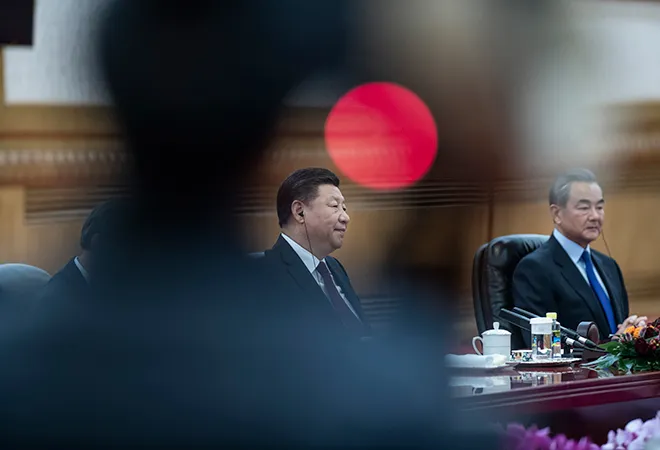-
CENTRES
Progammes & Centres
Location
India can’t afford to lower its guard with Xi’s plan to increase conscript intake.

Image Source: Fred Dufour — Getty
After a year of shrill diplomacy, signals emanating from China suggest that its tone is getting diluted with the newly elected US President Joe Biden settling into office. Who the Chinese tend to hold up, reveals a lot about their thinking.
Speaking at an event to explore the future of China’s relationship with the US, vice-minister of foreign affairs, Le Yucheng, evoked the memories of two Harvard academics who were instrumental in cementing Sino-American ties in the 20th century — Henry Kissinger and Ezra Vogel. Vogel, who documented the rise of China and Japan, was openly critical of then US President Donald Trump’s China policy. Before his demise in December, he wrote an open letter ‘China is not an enemy,’ which was endorsed by several scholars. Le said that the Sino-US relationship was marred by “traps of mistrust” and “poison of hatred” in the last four years, and that the two powers should reverse the wrong course.
January marks the 42nd anniversary of China and the United States establishing diplomatic relations; the People’s Republic’s envoy to the US, Cui Tiankai, drew upon memories of Deng Xiaoping’s 1979 visit to the US while speaking at an online interaction organised by the Chinese People’s Association for Peace and Disarmament and the Carter Center. Cui said that some people in the United States had tried to hijack America’s China policy and push relations towards confrontation. While the diplomats made a pitch for reconciliation, their boss President Xi Jinping addressed an online World Economic Forum event underscoring the need for the world to embrace “strategic communication” to build trust. Zhongnanhai seems to be smoking the peace pipe.
What explains these manoeuvres? First, China is taking a leaf out of America’s book. Former US Secretary of State, Mike Pompeo, constantly referred to the People’s Republic as “Communist” China, bringing into question its regime legitimacy. Pompeo drew from the American policy of the 1930s when it made such a distinction with respect to “Nazi” Germany. In China’s reckoning, the ransacking of the Capitol that Trump is alleged to have provoked with his speech, and his subsequent impeachment, has made him persona non grata in the minds of liberal American elites. At this stage, it suits the Chinese to rekindle memories of Vogel and Kissinger who served as bridges between East and West. Besides, Deng Xiaoping’s visit to the US in 1979 where he was photographed at a rodeo show in Texas, and the National Aeronautics and Space Administration’s Johnson Space Center create an amiable perception of China in American elites’ minds. They may even emphasise the point that Trump’s anti-China stance was an aberration in the “long-standing relationship.”
Second, “wolf-warrior” diplomacy was a result of the domestic compulsion of China’s system. After taking over China, Mao proclaimed that the nation had stood up to the world, Xi who has modelled himself after the Great Helmsman was certainly expected to match toughness with Trump. Now with the perceived whittling away of Trump’s political capital, China may be trying to turn on its charm offensive. Pew Research Center released a survey last October, stating that respondents across 14 nations believed China’s handling of the COVID-19 outbreak was inept, and negative perceptions of the nation had reached alarming proportions. The findings suggested that the unfavourable view of China was growing in the US. China has not forgotten that in the 1980s, then US President Ronald Regan’s demonisation of the Soviet Union as the “focus of evil in the modern world” created an adverse opinion about the regime. The “Evil Empire” characterisation could not be scrubbed clean despite Mikhail Gorbachev ushering in ‘glasnost’ that aimed at increased transparency in the USSR government’s functioning, and ‘perestroika’ that referred to reforms intended to restructure the Soviet system. Regan’s jibe presaged its demise. Since the pandemic outbreak, China’s aggressive stance along the Indian border, South China Sea and Taiwan created a pushback from many nations. The Biden administration has signalled that it will maintain continuity with the Trump dispensation, and has expressed concern over Beijing’s “ongoing attempts to intimidate its neighbours.” US National Security Advisor Jake Sullivan has gone to the extent of saying that the US must be prepared to impose costs on China for threatening Taiwan and Hong Kong. The recalibration of China’s diplomatic postures may have also been in part due to its calculation that it is unwise to have Japan, Australia and India backed by the US pushing back at the same time.
Third, China has a lot to gain by appearing to be a “moderate” and extending the proverbial olive branch. Despite all the talk in the West about isolating China after the pandemic, the European Union went ahead with its investment deal with China in December 2020, much to the chagrin of Biden. China has committed to a greater level of market access for EU automobile companies and insurers. Having driven a wedge between the US and allies, China senses that sooner or later America Inc. may pile pressure on Biden to open channels with China. Considering how much the US’ reserves have been drained and its economy hit, Biden may be forced to conciliate with a China that is talking about “cooperation.” In the long run, it may result in the efforts to decouple from Beijing coming to naught. Despite the lockdowns of 2020 across many nations, foreign direct investment (FDI) into China surged to US$ 163 billion in the past year, making it the largest beneficiary. A record US$ 119 billion was raised at the bourses in Hong Kong and on the mainland in 2020. During the same period, the flow of FDI to the US dropped 49% to US$ 134 billion, according to the United Nations Conference on Trade and Development.
Fourth, there are worries from unexpected quarters for China. After much foot-dragging, the World Health Organisation team began investigations in Wuhan, even visiting a research facility in the city that has been in the eye of a storm in connection with the origins of the novel coronavirus. The huge capital inflows into China notwithstanding, the nation’s planners are once again avoiding setting a GDP target for 2021. The Spring Festival is when the Chinese travel to be with their kin. Despite initial gloating that China had won the battle against the pandemic, a rise in fresh cases has ruined travel plans. The authorities have once again resorted to curbs; 28 January, the first day of the Spring Festival, saw around 60% fewer trips compared to 2019. Any fallout from the travel restrictions on social harmony in the year when decks are being cleared to celebrate the Chinese Communist Party’s centenary and tout its achievements is a big source of worry.
The big question is, can we take China’s “peace moves” at face value? It doesn’t seem so. China’s top leaders have put the onus squarely on Biden for improving relations, thereby, absolving themselves of any wrongdoing. Politburo member Yang Jiechi suggested this in his 1 February speech to the National Committee on US-China Relations. In China’s calculations, if Biden does not respond in a way it deems favourable, then it makes him the bad guy who spurned calls for “conciliation.” While Foreign Minister S. Jaishankar has underlined that the recognition of ‘three mutuals’ — respect, sensitivities and interests — are key to mending Sino-India ties, China maintains that the border issue cannot be linked with bilateral relations. India cannot wish away the massing of troops on the border, and new theatres of conflict. The two armies exchanged blows at Naku La in Sikkim on 20 January. China plans to double its intake into the armed forces; from 2021, it will start recruiting conscripts twice a year. For a China that has closely studied America’s ascent as a global power, it seems to be improvising upon President Theodore Roosevelt’s axiom: “Speak softly and carry a big stick; you will go far.”
The views expressed above belong to the author(s). ORF research and analyses now available on Telegram! Click here to access our curated content — blogs, longforms and interviews.

Kalpit A Mankikar is a Fellow with Strategic Studies programme and is based out of ORFs Delhi centre. His research focusses on China specifically looking ...
Read More +